Sketch of Public Policy Communion, May 2023
|
2023年5月份國政聯誼會縮影 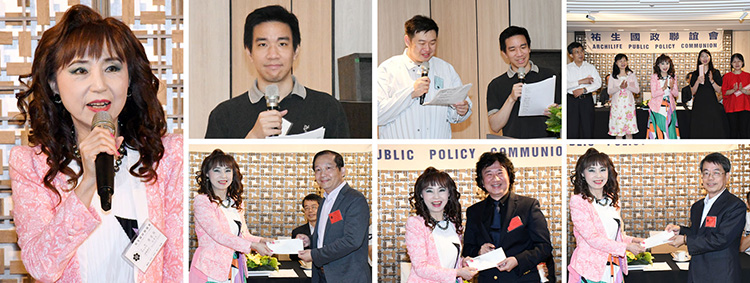 本會於2023年5月7日假晶華酒店地下三樓晶英會舉行「祐生國政聯誼會」。在主持人黃晉英秘書長宣布後揭開當日活動序幕,在輕鬆、活潑的節目之下,隨即由主持人帶來重要訊息:「氣候異變所造成的災變,對於全球生態環境造成嚴重衝擊,民間企業在時勢所趨下亦開始重視碳排放問題,許多企業已經制定了減碳目標,並採取積極行動減少碳排放。祐生生活特組也將持續針對氣候異變相關課題進行研討,也請大家在各自專業領域中,關注氣候異變所造成的影響。另外,人工智慧的發展炙手可熱,但有「人工智慧教父」之稱的Geoffrey Hinton博士,則認為人類的邏輯思考能力無可取代,而人工智慧的發展可能帶來危險,所以仍應謹慎應用。此外,中國新修訂的「反間諜法」將在7月1日生效,擴大間諜行為的定義,提醒大家特別注意。」 The May Archilife Public Policy Communion of 2023 was held on May 7, 2023. After a series of relaxing and fun activities, Secretary General Huang Chin-ying made the following announcement, "The climate crisis has a serious impact on the ecological environment worldwide. In this context, private enterprises have started paying attention to the issue of carbon emissions. Many enterprises have set carbon emissions reduction targets and have taken proactive action to reduce those emissions. The Archilife Living Special Team will continue to organize discussions on issues around climate change. We also ask everyone, in your field and post, to act with awareness of the impacts of climate change. In addition, developments in artificial intelligence are hot, but Dr. Geoffrey Hinton, the "Godfather of AI", believes that, while the logical thinking abilities of humans are irreplaceable, the development of AI comes with risks, so it should still be used with caution. In addition, China's newly revised Counter-Espionage Law, which will take effect on July 1, expands the definition of espionage. So, everyone is reminded to be extra careful." 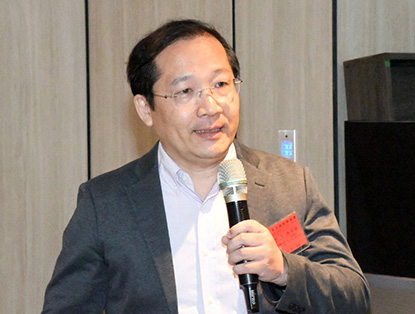 緊接著進行專題演講,由國政委員林芳銘先生主講「木質家具產品減碳效益」。主講人首先介紹我國建築音環境相關政策推動歷程,接著,主講人表示建築會產生許多碳排放,政府在台灣2050淨零排放提到,希望推動木質構造建築及提昇國產材自給率。主講人以東京奧運主場館及台灣那瑪夏民權國小為例,皆使用國產木材。所以,國產木材應優先使用以減少碳足跡,並重視木材利用之碳貯藏(固碳)效果。主講人也介紹國產材木質家具,產品進一步標示固碳量及臺灣林產品生產追溯(QR code)。最後,主講人分享學生設計一款可升降之小學課桌椅,給予偏鄉小學嶄新的使用體驗。 緊接著進行專題演講,由國政委員林芳銘先生主講「木質家具產品減碳效益」。主講人首先介紹我國建築音環境相關政策推動歷程,接著,主講人表示建築會產生許多碳排放,政府在台灣2050淨零排放提到,希望推動木質構造建築及提昇國產材自給率。主講人以東京奧運主場館及台灣那瑪夏民權國小為例,皆使用國產木材。所以,國產木材應優先使用以減少碳足跡,並重視木材利用之碳貯藏(固碳)效果。主講人也介紹國產材木質家具,產品進一步標示固碳量及臺灣林產品生產追溯(QR code)。最後,主講人分享學生設計一款可升降之小學課桌椅,給予偏鄉小學嶄新的使用體驗。Next on the schedule was the keynote speech. First, Mr. Lin Fang-ming presented a speech on the "The Benefits of Lower Carbon Emissions from Wooden Furniture". The speaker first introduced Taiwan's historical process of promoting policies to build a sound-conscious environment. The speaker added that construction will produce a lot of carbon emissions. Under its policy goal of net zero emissions by 2050, the Taiwan government promotes wooden buildings and national self-sufficiency building materials. The speaker cited the main stadium of the Tokyo Olympics and the Minquan Elementary School in Namasia District of Kaohsiung City Taiwan as examples of buildings built with domestic wood. Domestic wood should be used first to reduce the nation’s carbon footprint, and the positive impacts of carbon storage through using wood should receive greater attention. Furthermore, the speaker introduced furniture made from domestic wood, especially products that come with a statement of the amount of carbon stored in them. He also discussed the traceability of Taiwanese forestry products through QR code. Finally, the speaker shared that students had designed a liftable desk and chair for primary schools to give rural primary schools a brand-new experience. 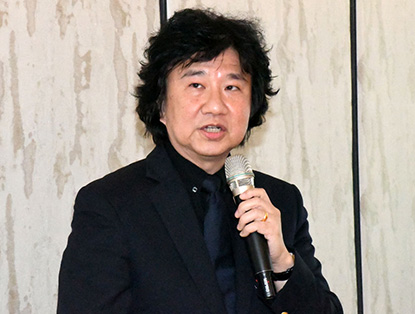 接著由國政委員洪啟東先生主講「疫情與觀光:本土案例」。主講人首先表示這幾年COVID-19大流行不僅是全球健康危機,也是經濟威脅,已經改變許多企業的運營和個人的生計,尤以依賴觀光旅遊業的地區更受疫病影響。所以,探討城市脆弱性特徵和形成機制,有利於觀光旅遊業應對疫情,促進危機管理和產業結構調整。主講人以台灣東部地區為例,經由田野調查與深入訪談,顯示疫情對於觀光產業市場衝擊,相較於觀光補助手段,振興策略是吸引觀光客前來的一大主因。主講人表示,在疫病流行的當下,城市韌性扮演重要角色,使其面對衝擊與壓力仍有能力持續運作,同時也積極適應及轉型,實現永續能力。 接著由國政委員洪啟東先生主講「疫情與觀光:本土案例」。主講人首先表示這幾年COVID-19大流行不僅是全球健康危機,也是經濟威脅,已經改變許多企業的運營和個人的生計,尤以依賴觀光旅遊業的地區更受疫病影響。所以,探討城市脆弱性特徵和形成機制,有利於觀光旅遊業應對疫情,促進危機管理和產業結構調整。主講人以台灣東部地區為例,經由田野調查與深入訪談,顯示疫情對於觀光產業市場衝擊,相較於觀光補助手段,振興策略是吸引觀光客前來的一大主因。主講人表示,在疫病流行的當下,城市韌性扮演重要角色,使其面對衝擊與壓力仍有能力持續運作,同時也積極適應及轉型,實現永續能力。Next, Mr. Hung Chi-tung spoke on "Pandemic and Tourism: Local Cases". The speaker opened with describing the covid-19 pandemic in recent years as a global health crisis and an economic threat, which has changed many business operations and affected people's livelihoods, especially in regions that rely on tourism. Exploring the characteristics and formation mechanisms of urban vulnerability may benefit the tourism industry's response to the epidemic in terms of crisis management and industry restructuring. The speaker looked at Eastern Taiwan as an example. Based on field research and in-depth interviews, he demonstrated how covid-19 has impacted the tourism industry there. More than tourism vouchers, the revitalization strategy has been a major pull factor for attracting tourists. He added that during the epidemic, urban resilience played an important role, as it enabled business continuity despite shocks and pressures, while actively adapting and transforming tourism toward greater sustainability. 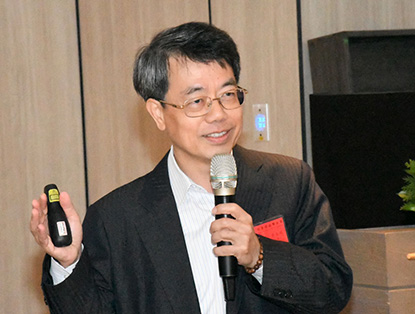 接著由國政委員邵文政先生主講「推動永續幸福新健築」。主講人首先說明室內空氣品質不良對於健康有所危害,選用健康綠建材標章產品得以有效降低甲醛、TVOC之濃度。我國推動綠建築標章、綠建材標章行之有年,唯並未對裝修過程進行規範,故推動綠裝修認證制度,分成四個階段:設計、選材、施工與完工,使能與SDGs及ESG接軌。主講人接著介紹台灣Sick-Building診斷士之培訓,以及健康建築國際認證標章「WELL」。主講人分享團隊將廢棄蚵殼變身為貝殼磚,獲得 C2C國際認證。強調減少來源端,以健康永續的材料,成就幸福「健」築,達成永續循環及健康養生的理念與目標。 接著由國政委員邵文政先生主講「推動永續幸福新健築」。主講人首先說明室內空氣品質不良對於健康有所危害,選用健康綠建材標章產品得以有效降低甲醛、TVOC之濃度。我國推動綠建築標章、綠建材標章行之有年,唯並未對裝修過程進行規範,故推動綠裝修認證制度,分成四個階段:設計、選材、施工與完工,使能與SDGs及ESG接軌。主講人接著介紹台灣Sick-Building診斷士之培訓,以及健康建築國際認證標章「WELL」。主講人分享團隊將廢棄蚵殼變身為貝殼磚,獲得 C2C國際認證。強調減少來源端,以健康永續的材料,成就幸福「健」築,達成永續循環及健康養生的理念與目標。Next, Mr. Shao Wen-cheng spoke on "Promoting New Healthy Buildings for Sustainable Happiness". The speaker first described how poor indoor air quality harms our health, and using building materials with healthy green labels can effectively reduce the concentration of formaldehyde and TVOC. Taiwan has been promoting labels for green buildings and green building materials for a long time, but remodeling processes are far from standardized. A certification system for green remodeling, to be introduced soon, will be divided into four stages: design, material selection, construction and completion, enabling alignment with the SDG goals and ESG requirements. The speaker then described the training of sick-building diagnosticians in Taiwan and the international WELL certification mark for healthy buildings. Finally, the speaker spoke about how his company turns discarded oyster shells into shell bricks, which have been awarded the international C2C certification. Using fewer sources and healthy, sustainable materials help create happy and healthy buildings that foster sustainability and health. 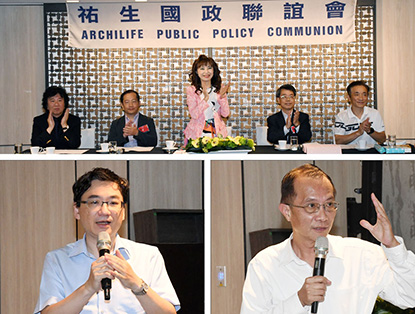 演講完畢,黃晉英秘書長代表基金會致贈謝禮予主講人。接著在與會者紛紛利用「餵豬時間」提出個人意見與看法交流後,圓滿地結束五月份國政聯誼會。 演講完畢,黃晉英秘書長代表基金會致贈謝禮予主講人。接著在與會者紛紛利用「餵豬時間」提出個人意見與看法交流後,圓滿地結束五月份國政聯誼會。After the speech, Secretary General Huang Chin-ying presented a gift to the speakers on behalf of the foundation. Then, attendees expressed and exchanged their opinions and views during the piggy hour. The May Archilife Public Policy Communion ended smoothly. |

